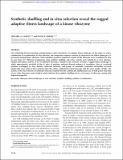| dc.contributor.author | Bartel, David | |
| dc.contributor.author | Curtis, Edward A. | |
| dc.date.accessioned | 2015-03-27T16:14:25Z | |
| dc.date.available | 2015-03-27T16:14:25Z | |
| dc.date.issued | 2013-06 | |
| dc.date.submitted | 2012-12 | |
| dc.identifier.issn | 1355-8382 | |
| dc.identifier.issn | 1469-9001 | |
| dc.identifier.uri | http://hdl.handle.net/1721.1/96216 | |
| dc.description.abstract | The relationship between genotype and phenotype is often described as an adaptive fitness landscape. In this study, we used a combination of recombination, in vitro selection, and comparative sequence analysis to characterize the fitness landscape of a previously isolated kinase ribozyme. Point mutations present in improved variants of this ribozyme were recombined in vitro in more than 10[superscript 14] different arrangements using synthetic shuffling, and active variants were isolated by in vitro selection. Mutual information analysis of 65 recombinant ribozymes isolated in the selection revealed a rugged fitness landscape in which approximately one-third of the 91 pairs of positions analyzed showed evidence of correlation. Pairs of correlated positions overlapped to form densely connected networks, and groups of maximally connected nucleotides occurred significantly more often in these networks than they did in randomized control networks with the same number of links. The activity of the most efficient recombinant ribozyme isolated from the synthetically shuffled pool was 30-fold greater than that of any of the ribozymes used to build it, which indicates that synthetic shuffling can be a rich source of ribozyme variants with improved properties. | en_US |
| dc.description.sponsorship | National Institutes of Health (U.S.) (Grant GM061835) | en_US |
| dc.language.iso | en_US | |
| dc.publisher | Cold Spring Harbor Laboratory Press | en_US |
| dc.relation.isversionof | http://dx.doi.org/10.1261/rna.037572.112 | en_US |
| dc.rights | Creative Commons Attribution-NonCommercial 3.0 Unported Licence | en_US |
| dc.rights.uri | http://creativecommons.org/licenses/by-nc/3.0/ | en_US |
| dc.source | Cold Spring Harbor Laboratory Press | en_US |
| dc.title | Synthetic shuffling and in vitro selection reveal the rugged adaptive fitness landscape of a kinase ribozyme | en_US |
| dc.type | Article | en_US |
| dc.identifier.citation | Curtis, E. A., and D. P. Bartel. “Synthetic Shuffling and in Vitro Selection Reveal the Rugged Adaptive Fitness Landscape of a Kinase Ribozyme.” RNA 19, no. 8 (June 24, 2013): 1116–1128. | en_US |
| dc.contributor.department | Massachusetts Institute of Technology. Department of Biology | en_US |
| dc.contributor.mitauthor | Bartel, David | en_US |
| dc.relation.journal | RNA | en_US |
| dc.eprint.version | Final published version | en_US |
| dc.type.uri | http://purl.org/eprint/type/JournalArticle | en_US |
| eprint.status | http://purl.org/eprint/status/PeerReviewed | en_US |
| dspace.orderedauthors | Curtis, E. A.; Bartel, D. P. | en_US |
| dc.identifier.orcid | https://orcid.org/0000-0002-3872-2856 | |
| mit.license | PUBLISHER_CC | en_US |
| mit.metadata.status | Complete | |
